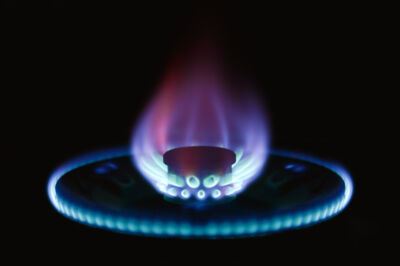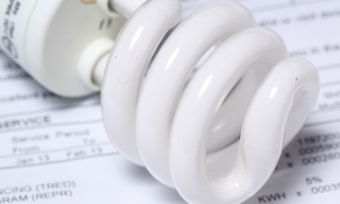LPG vs natural gas: What should you get?

KEY POINTS
- Natural gas is supplied via a mains pipe, while liquid petroleum gas (LPG) is stored in cylinders to be used with specific appliances.
- Natural gas is typically cheaper than LPG, but users must pay supply charges for natural gas or an annual fee covering the rental of LPG cylinders.
- Whether LPG or natural gas is better depends on factors such as location, gas suppliers in your area, gas usage and existing base rates of gas plans.
Australians have two choices in terms of gas for their homes: liquid petroleum gas (LPG) or natural gas. But what’s the difference? Which one is better? Canstar Blue discusses the main differences and advantages — and whether one is cheaper than the other.
Aside from electricity powering Aussie homes, gas can be a common source of power for many utilities. Whether it’s frying dinner on a stovetop or lunging into that well-earned bath after work, gas has a range of uses and may even be a cost-effective alternative to relying solely on electricity. But which type of gas reigns supreme? We’re of course referring to the contest between natural gas and LPG.
What’s the difference between LPG and natural gas?
The main difference between natural gas and LPG is how they are supplied to a customer. Natural gas is distributed via the mains pipe connected to a house and used for cooking or heating water. LPG is supplied in a cylinder or tank, and is then connected to a specific appliance, such as a barbeque or outdoor heater.
Is LPG propane?
Yes, LPG consists mainly of propane — a type of gas produced as a by-product of refining or processing fossil fuels. Otherwise known as ‘liquified petroleum gas’, LPG produces a slightly higher level of heat than natural gas, but will need to be replaced once the cylinder has run out of gas.
Is natural gas methane?
Natural gas is composed of methane, an odourless and highly combustible gas sourced from onshore or offshore fuel deposits. Methane is lighter than air and dissipates at a much higher rate than LPG if leaking, which can be safer.
Natural gas vs LPG vs LNG vs CNG
It’s not just LPG and natural gas that comes up when discussing fuel sources and energy. LNG and CNG are also worth getting familiar with. Here’s a breakdown to help you understand what sets them apart:
- Natural gas: Methane (CH4) is the main component. It’s lighter than air and disperses easily in leaks. It’s also delivered through pipelines directly to homes and businesses for various uses
- LPG (liquefied petroleum gas): A mixture of propane and butane (C3H8 & C4H10), sometimes combined, stored in a liquefied state under pressure
- LNG (liquefied natural gas): Natural gas is transformed into a liquid state for efficient long-distance transport through a process called cryogenic cooling
- CNG (compressed natural gas): Natural gas (methane) stored under high pressure for efficient storage. This compressed form makes it a suitable fuel source for vehicles.
But enough science, what are the selling points of natural gas and LPG?
Compare gas plans
Here are some of the cheapest gas deals on our database for NSW. These estimated annual costs are based on the Jemena Gas Network in Sydney and yearly gas usage of 18,800 MJ/year, but prices will vary depending on your own circumstances. The products are listed in order of lowest estimated price/year (including conditional discounts), then by the highest value rank (out of 10), then by highest brand satisfaction rating. These are products from referral partners†. Our database may not cover all deals in your area, and please check retailer websites for up to date information.
-
12 month energy plan with no exit fees Glossary
-
No lock in contract with variable rates Glossary
-
12 month energy plan with no exit fees Glossary
-
No lock in contract with variable rates Glossary
-
Ongoing energy plan with no renewal required Glossary
-
No lock in contract with variable rates Glossary
-
Ongoing energy plan with no renewal required Glossary
-
No lock in contract with variable rates Glossary
-
Ongoing energy plan with no renewal required Glossary
-
No lock in contract with variable rates Glossary
-
Ongoing energy plan with no renewal required Glossary
-
No lock in contract with variable rates Glossary
-
Ongoing energy plan with no renewal required Glossary
-
No lock in contract with variable rates Glossary
-
Ongoing energy plan with no renewal required Glossary
-
No lock in contract with variable rates Glossary
Advertiser Disclosure
Canstar Blue may earn a fee from its Online Partners for referrals from its website tables, and from sponsorship or promotion of certain products. Fees payable by product providers for referrals and sponsorship or promotion may vary between providers, website position, and revenue model. Sponsorship/promotion fees may be higher than referral fees. If a product is sponsored or promoted, it is an ad and it is clearly marked as such. An ad might appear in different places on our website, such as in comparison tables and articles. Ads may be displayed in a fixed position in a table, regardless of the product’s rating, price or other attributes. The location of an ad doesn’t indicate any ranking or rating by Canstar Blue. Payment of fees for ads does not influence Value Rank or Customer Satisfaction Ratings. See How We Get Paid to find out more.
General Disclosure – Energy
The data in the table is updated within 24 hours of Canstar Blue becoming aware of a change. You can find a description of the initial sort order below the table. You can use the sort buttons at the top of each column to re-order the display. Learn more about our Gas Value Rank Methodology.
Please note that the Satisfaction Rating displayed in the table is a rating relating to customers’ overall satisfaction with the brand. It should not be confused with an individual product rating. Learn more about Brand Satisfaction ratings and for more information on how the Brand Satisfaction ratings are calculated, read the Canstar Blue Most Satisfied Customers Methodology.
The results do not include all energy retailers or products in the market and may not compare all features relevant to you. Canstar Blue does not supply electricity or gas services. If you decide to apply for a particular energy product, you will deal directly with the retailer, not with Canstar Blue. Fees, charges, product information and contract terms should be confirmed directly with the relevant retailer.
Some plans may require you to meet certain conditions before a discount may become available to you. Check the energy provider’s plan information for details of all possible discounts that may apply and any conditions that need to be met for you to be eligible for these discounts.
Check your current plan’s exit fees and other termination provisions before changing providers.
Some plans may have a minimum term that is longer than one year. In that case the total cost over the term will be much higher than the estimated Price, which is for one year only. Consider the provider’s detailed product and pricing information before making a decision to take out a new plan or switch electricity providers.
Pricing Information
The price shown is inclusive of GST and is the estimated lowest possible price a representative customer would be charged in a year for each plan, assuming all conditions of discounts offered, if any, have been met. Gas usage assumptions have been derived from the average usages advertised by a selection of retailers in the distribution region as shown at the top of the table.
The general usage assumptions for products displayed in the table have been derived from:
- the average usages advertised by a selection of retailers in the distribution region as shown at the top of the table. The figures provided are intended to serve as general estimates and should be used for information only. If the amount of gas you actually use differs greatly from this estimate, your bill could be significantly larger or smaller than the estimated price/year listed for each plan; or
- if you have provided usage data from your gas bill, the estimated annual amount payable for this plan is based on your individual circumstances.
The estimated yearly Price is based on single rate tariffs, which is when a flat usage rate is charged for ‘blocks’ of gas consumed and could be a limited amount per day, month, quarter, which may include a second block with a different usage rate applied, or, season.
Some plans may have a minimum term longer than one year – in that case the total cost over the term will be much higher than the estimated yearly Price (which is only for one year).
Some plans may apply additional charges to the price shown. Always check the energy provider’s plan information for details of all charges that may apply.
What does the ‘phone’ mean?
By clicking on the number next to the phone icon, you will leave the Canstar Blue website and be connected with the call centre of the Online Partner’s brand that you have selected. You will be subject to that referral partner’s brand privacy policy and terms of use. You agree that Canstar Blue Referral Terms apply to this referral.
Here are some of the cheapest gas deals on our database for VIC. These estimated annual costs are based on the AGN – VIC network in Melbourne and yearly gas usage of 40,500 MJ/year, but prices will vary depending on your own circumstances. The products are listed in order of lowest estimated price/year (including conditional discounts), then by the highest value rank (out of 10), then by highest brand satisfaction rating. These are products from referral partners†. Our database may not cover all deals in your area, and please check retailer websites for up to date information.
-
Ongoing energy plan with no renewal required Glossary
-
No lock in contract with variable rates Glossary
-
12 month energy plan with no exit fees Glossary
-
No lock in contract with variable rates Glossary
-
Ongoing energy plan with no renewal required Glossary
-
No lock in contract with variable rates Glossary
-
Ongoing energy plan with no renewal required Glossary
-
No lock in contract with variable rates Glossary
-
Ongoing energy plan with no renewal required Glossary
-
No lock in contract with variable rates Glossary
-
Ongoing energy plan with no renewal required Glossary
-
No lock in contract with variable rates Glossary
-
Ongoing energy plan with no renewal required Glossary
-
No lock in contract with variable rates Glossary
-
12 month energy plan with no exit fees Glossary
-
No lock in contract with variable rates Glossary
Advertiser Disclosure
Canstar Blue may earn a fee from its Online Partners for referrals from its website tables, and from sponsorship or promotion of certain products. Fees payable by product providers for referrals and sponsorship or promotion may vary between providers, website position, and revenue model. Sponsorship/promotion fees may be higher than referral fees. If a product is sponsored or promoted, it is an ad and it is clearly marked as such. An ad might appear in different places on our website, such as in comparison tables and articles. Ads may be displayed in a fixed position in a table, regardless of the product’s rating, price or other attributes. The location of an ad doesn’t indicate any ranking or rating by Canstar Blue. Payment of fees for ads does not influence Value Rank or Customer Satisfaction Ratings. See How We Get Paid to find out more.
General Disclosure – Energy
The data in the table is updated within 24 hours of Canstar Blue becoming aware of a change. You can find a description of the initial sort order below the table. You can use the sort buttons at the top of each column to re-order the display. Learn more about our Gas Value Rank Methodology.
Please note that the Satisfaction Rating displayed in the table is a rating relating to customers’ overall satisfaction with the brand. It should not be confused with an individual product rating. Learn more about Brand Satisfaction ratings and for more information on how the Brand Satisfaction ratings are calculated, read the Canstar Blue Most Satisfied Customers Methodology.
The results do not include all energy retailers or products in the market and may not compare all features relevant to you. Canstar Blue does not supply electricity or gas services. If you decide to apply for a particular energy product, you will deal directly with the retailer, not with Canstar Blue. Fees, charges, product information and contract terms should be confirmed directly with the relevant retailer.
Some plans may require you to meet certain conditions before a discount may become available to you. Check the energy provider’s plan information for details of all possible discounts that may apply and any conditions that need to be met for you to be eligible for these discounts.
Check your current plan’s exit fees and other termination provisions before changing providers.
Some plans may have a minimum term that is longer than one year. In that case the total cost over the term will be much higher than the estimated Price, which is for one year only. Consider the provider’s detailed product and pricing information before making a decision to take out a new plan or switch electricity providers.
Pricing Information
The price shown is inclusive of GST and is the estimated lowest possible price a representative customer would be charged in a year for each plan, assuming all conditions of discounts offered, if any, have been met. Gas usage assumptions have been derived from the average usages advertised by a selection of retailers in the distribution region as shown at the top of the table.
The general usage assumptions for products displayed in the table have been derived from:
- the average usages advertised by a selection of retailers in the distribution region as shown at the top of the table. The figures provided are intended to serve as general estimates and should be used for information only. If the amount of gas you actually use differs greatly from this estimate, your bill could be significantly larger or smaller than the estimated price/year listed for each plan; or
- if you have provided usage data from your gas bill, the estimated annual amount payable for this plan is based on your individual circumstances.
The estimated yearly Price is based on single rate tariffs, which is when a flat usage rate is charged for ‘blocks’ of gas consumed and could be a limited amount per day, month, quarter, which may include a second block with a different usage rate applied, or, season.
Some plans may have a minimum term longer than one year – in that case the total cost over the term will be much higher than the estimated yearly Price (which is only for one year).
Some plans may apply additional charges to the price shown. Always check the energy provider’s plan information for details of all charges that may apply.
What does the ‘phone’ mean?
By clicking on the number next to the phone icon, you will leave the Canstar Blue website and be connected with the call centre of the Online Partner’s brand that you have selected. You will be subject to that referral partner’s brand privacy policy and terms of use. You agree that Canstar Blue Referral Terms apply to this referral.
Here are some of the cheapest gas deals on our database for QLD. These estimated annual costs are based on the AGN – QLD in Brisbane and yearly gas usage of 8,300 MJ/year, but prices will vary depending on your own circumstances. The products are listed in order of lowest estimated price/year (including conditional discounts), then by the highest value rank (out of 10), then by highest brand satisfaction rating. These are products from referral partners†. Our database may not cover all deals in your area, and please check retailer websites for up to date information.
-
12 month energy plan with no exit fees Glossary
-
No lock in contract with variable rates Glossary
-
Ongoing energy plan with no renewal required Glossary
-
No lock in contract with variable rates Glossary
-
Ongoing energy plan with no renewal required Glossary
-
No lock in contract with variable rates Glossary
-
Ongoing energy plan with no renewal required Glossary
-
No lock in contract with variable rates Glossary
-
12 month energy plan with no exit fees Glossary
-
No lock in contract with variable rates Glossary
-
12 month energy plan with no exit fees Glossary
-
No lock in contract with variable rates Glossary
-
Ongoing energy plan with no renewal required Glossary
-
No lock in contract with variable rates Glossary
-
Ongoing energy plan with no renewal required Glossary
-
No lock in contract with variable rates Glossary
Advertiser Disclosure
Canstar Blue may earn a fee from its Online Partners for referrals from its website tables, and from sponsorship or promotion of certain products. Fees payable by product providers for referrals and sponsorship or promotion may vary between providers, website position, and revenue model. Sponsorship/promotion fees may be higher than referral fees. If a product is sponsored or promoted, it is an ad and it is clearly marked as such. An ad might appear in different places on our website, such as in comparison tables and articles. Ads may be displayed in a fixed position in a table, regardless of the product’s rating, price or other attributes. The location of an ad doesn’t indicate any ranking or rating by Canstar Blue. Payment of fees for ads does not influence Value Rank or Customer Satisfaction Ratings. See How We Get Paid to find out more.
General Disclosure – Energy
The data in the table is updated within 24 hours of Canstar Blue becoming aware of a change. You can find a description of the initial sort order below the table. You can use the sort buttons at the top of each column to re-order the display. Learn more about our Gas Value Rank Methodology.
Please note that the Satisfaction Rating displayed in the table is a rating relating to customers’ overall satisfaction with the brand. It should not be confused with an individual product rating. Learn more about Brand Satisfaction ratings and for more information on how the Brand Satisfaction ratings are calculated, read the Canstar Blue Most Satisfied Customers Methodology.
The results do not include all energy retailers or products in the market and may not compare all features relevant to you. Canstar Blue does not supply electricity or gas services. If you decide to apply for a particular energy product, you will deal directly with the retailer, not with Canstar Blue. Fees, charges, product information and contract terms should be confirmed directly with the relevant retailer.
Some plans may require you to meet certain conditions before a discount may become available to you. Check the energy provider’s plan information for details of all possible discounts that may apply and any conditions that need to be met for you to be eligible for these discounts.
Check your current plan’s exit fees and other termination provisions before changing providers.
Some plans may have a minimum term that is longer than one year. In that case the total cost over the term will be much higher than the estimated Price, which is for one year only. Consider the provider’s detailed product and pricing information before making a decision to take out a new plan or switch electricity providers.
Pricing Information
The price shown is inclusive of GST and is the estimated lowest possible price a representative customer would be charged in a year for each plan, assuming all conditions of discounts offered, if any, have been met. Gas usage assumptions have been derived from the average usages advertised by a selection of retailers in the distribution region as shown at the top of the table.
The general usage assumptions for products displayed in the table have been derived from:
- the average usages advertised by a selection of retailers in the distribution region as shown at the top of the table. The figures provided are intended to serve as general estimates and should be used for information only. If the amount of gas you actually use differs greatly from this estimate, your bill could be significantly larger or smaller than the estimated price/year listed for each plan; or
- if you have provided usage data from your gas bill, the estimated annual amount payable for this plan is based on your individual circumstances.
The estimated yearly Price is based on single rate tariffs, which is when a flat usage rate is charged for ‘blocks’ of gas consumed and could be a limited amount per day, month, quarter, which may include a second block with a different usage rate applied, or, season.
Some plans may have a minimum term longer than one year – in that case the total cost over the term will be much higher than the estimated yearly Price (which is only for one year).
Some plans may apply additional charges to the price shown. Always check the energy provider’s plan information for details of all charges that may apply.
What does the ‘phone’ mean?
By clicking on the number next to the phone icon, you will leave the Canstar Blue website and be connected with the call centre of the Online Partner’s brand that you have selected. You will be subject to that referral partner’s brand privacy policy and terms of use. You agree that Canstar Blue Referral Terms apply to this referral.
Here are some of the cheapest gas deals on our database for SA. These estimated annual costs are based on the AGN – SA network in Adelaide and yearly gas usage of 14,800 MJ/year, but prices will vary depending on your own circumstances. The products are listed in order of lowest estimated price/year (including conditional discounts), then by the highest value rank (out of 10), then by highest brand satisfaction rating. These are products from referral partners†. Our database may not cover all deals in your area, and please check retailer websites for up to date information.
-
Ongoing energy plan with no renewal required Glossary
-
No lock in contract with variable rates Glossary
-
Ongoing energy plan with no renewal required Glossary
-
No lock in contract with variable rates Glossary
-
Ongoing energy plan with no renewal required Glossary
-
No lock in contract with variable rates Glossary
-
Ongoing energy plan with no renewal required Glossary
-
No lock in contract with variable rates Glossary
-
Ongoing energy plan with no renewal required Glossary
-
No lock in contract with variable rates Glossary
-
Ongoing energy plan with no renewal required Glossary
-
No lock in contract with variable rates Glossary
-
12 month energy plan with no exit fees Glossary
-
No lock in contract with variable rates Glossary
-
12 month energy plan with no exit fees Glossary
-
No lock in contract with variable rates Glossary
Advertiser Disclosure
Canstar Blue may earn a fee from its Online Partners for referrals from its website tables, and from sponsorship or promotion of certain products. Fees payable by product providers for referrals and sponsorship or promotion may vary between providers, website position, and revenue model. Sponsorship/promotion fees may be higher than referral fees. If a product is sponsored or promoted, it is an ad and it is clearly marked as such. An ad might appear in different places on our website, such as in comparison tables and articles. Ads may be displayed in a fixed position in a table, regardless of the product’s rating, price or other attributes. The location of an ad doesn’t indicate any ranking or rating by Canstar Blue. Payment of fees for ads does not influence Value Rank or Customer Satisfaction Ratings. See How We Get Paid to find out more.
General Disclosure – Energy
The data in the table is updated within 24 hours of Canstar Blue becoming aware of a change. You can find a description of the initial sort order below the table. You can use the sort buttons at the top of each column to re-order the display. Learn more about our Gas Value Rank Methodology.
Please note that the Satisfaction Rating displayed in the table is a rating relating to customers’ overall satisfaction with the brand. It should not be confused with an individual product rating. Learn more about Brand Satisfaction ratings and for more information on how the Brand Satisfaction ratings are calculated, read the Canstar Blue Most Satisfied Customers Methodology.
The results do not include all energy retailers or products in the market and may not compare all features relevant to you. Canstar Blue does not supply electricity or gas services. If you decide to apply for a particular energy product, you will deal directly with the retailer, not with Canstar Blue. Fees, charges, product information and contract terms should be confirmed directly with the relevant retailer.
Some plans may require you to meet certain conditions before a discount may become available to you. Check the energy provider’s plan information for details of all possible discounts that may apply and any conditions that need to be met for you to be eligible for these discounts.
Check your current plan’s exit fees and other termination provisions before changing providers.
Some plans may have a minimum term that is longer than one year. In that case the total cost over the term will be much higher than the estimated Price, which is for one year only. Consider the provider’s detailed product and pricing information before making a decision to take out a new plan or switch electricity providers.
Pricing Information
The price shown is inclusive of GST and is the estimated lowest possible price a representative customer would be charged in a year for each plan, assuming all conditions of discounts offered, if any, have been met. Gas usage assumptions have been derived from the average usages advertised by a selection of retailers in the distribution region as shown at the top of the table.
The general usage assumptions for products displayed in the table have been derived from:
- the average usages advertised by a selection of retailers in the distribution region as shown at the top of the table. The figures provided are intended to serve as general estimates and should be used for information only. If the amount of gas you actually use differs greatly from this estimate, your bill could be significantly larger or smaller than the estimated price/year listed for each plan; or
- if you have provided usage data from your gas bill, the estimated annual amount payable for this plan is based on your individual circumstances.
The estimated yearly Price is based on single rate tariffs, which is when a flat usage rate is charged for ‘blocks’ of gas consumed and could be a limited amount per day, month, quarter, which may include a second block with a different usage rate applied, or, season.
Some plans may have a minimum term longer than one year – in that case the total cost over the term will be much higher than the estimated yearly Price (which is only for one year).
Some plans may apply additional charges to the price shown. Always check the energy provider’s plan information for details of all charges that may apply.
What does the ‘phone’ mean?
By clicking on the number next to the phone icon, you will leave the Canstar Blue website and be connected with the call centre of the Online Partner’s brand that you have selected. You will be subject to that referral partner’s brand privacy policy and terms of use. You agree that Canstar Blue Referral Terms apply to this referral.
Here are some of the cheapest gas deals on our database for WA. These estimated annual costs are based on the ATCO network in Perth and yearly gas usage of 6,300 units/year, but prices will vary depending on your own circumstances. The products are listed in order of lowest estimated price/year (including conditional discounts), then by the highest value rank (out of 10), then by highest brand satisfaction rating. These are products from referral partners†. Our database may not cover all deals in your area, and please check retailer websites for up to date information.
-
Conditional discounts: 35% off the usage charge with direct debit & e-billing Glossary
-
12 month energy plan with no exit fees Glossary
-
No lock in contract with variable rates Glossary
-
12 month energy plan with no exit fees Glossary
-
No lock in contract with variable rates Glossary
-
12 month energy plan with no exit fees Glossary
-
No lock in contract with variable rates Glossary
-
12 month energy plan with no exit fees Glossary
-
No lock in contract with variable rates Glossary
-
12 month energy plan with no exit fees Glossary
-
No lock in contract with variable rates Glossary
-
12 month energy plan with no exit fees Glossary
-
No lock in contract with variable rates Glossary
-
Conditional discounts: 35% off the usage charge with direct debit & e-billing Glossary
-
12 month energy plan with no exit fees Glossary
-
No lock in contract with variable rates Glossary
-
Conditional discounts: 25% off the usage charge with direct debit & e-billing Glossary
-
Ongoing energy plan with no renewal required Glossary
-
No lock in contract with variable rates Glossary
Advertiser Disclosure
Canstar Blue may earn a fee from its Online Partners for referrals from its website tables, and from sponsorship or promotion of certain products. Fees payable by product providers for referrals and sponsorship or promotion may vary between providers, website position, and revenue model. Sponsorship/promotion fees may be higher than referral fees. If a product is sponsored or promoted, it is an ad and it is clearly marked as such. An ad might appear in different places on our website, such as in comparison tables and articles. Ads may be displayed in a fixed position in a table, regardless of the product’s rating, price or other attributes. The location of an ad doesn’t indicate any ranking or rating by Canstar Blue. Payment of fees for ads does not influence Value Rank or Customer Satisfaction Ratings. See How We Get Paid to find out more.
General Disclosure – Energy
The data in the table is updated within 24 hours of Canstar Blue becoming aware of a change. You can find a description of the initial sort order below the table. You can use the sort buttons at the top of each column to re-order the display. Learn more about our Gas Value Rank Methodology.
Please note that the Satisfaction Rating displayed in the table is a rating relating to customers’ overall satisfaction with the brand. It should not be confused with an individual product rating. Learn more about Brand Satisfaction ratings and for more information on how the Brand Satisfaction ratings are calculated, read the Canstar Blue Most Satisfied Customers Methodology.
The results do not include all energy retailers or products in the market and may not compare all features relevant to you. Canstar Blue does not supply electricity or gas services. If you decide to apply for a particular energy product, you will deal directly with the retailer, not with Canstar Blue. Fees, charges, product information and contract terms should be confirmed directly with the relevant retailer.
Some plans may require you to meet certain conditions before a discount may become available to you. Check the energy provider’s plan information for details of all possible discounts that may apply and any conditions that need to be met for you to be eligible for these discounts.
Check your current plan’s exit fees and other termination provisions before changing providers.
Some plans may have a minimum term that is longer than one year. In that case the total cost over the term will be much higher than the estimated Price, which is for one year only. Consider the provider’s detailed product and pricing information before making a decision to take out a new plan or switch electricity providers.
Pricing Information
The price shown is inclusive of GST and is the estimated lowest possible price a representative customer would be charged in a year for each plan, assuming all conditions of discounts offered, if any, have been met. Gas usage assumptions have been derived from the average usages advertised by a selection of retailers in the distribution region as shown at the top of the table.
The general usage assumptions for products displayed in the table have been derived from:
- the average usages advertised by a selection of retailers in the distribution region as shown at the top of the table. The figures provided are intended to serve as general estimates and should be used for information only. If the amount of gas you actually use differs greatly from this estimate, your bill could be significantly larger or smaller than the estimated price/year listed for each plan; or
- if you have provided usage data from your gas bill, the estimated annual amount payable for this plan is based on your individual circumstances.
The estimated yearly Price is based on single rate tariffs, which is when a flat usage rate is charged for ‘blocks’ of gas consumed and could be a limited amount per day, month, quarter, which may include a second block with a different usage rate applied, or, season.
Some plans may have a minimum term longer than one year – in that case the total cost over the term will be much higher than the estimated yearly Price (which is only for one year).
Some plans may apply additional charges to the price shown. Always check the energy provider’s plan information for details of all charges that may apply.
What does the ‘phone’ mean?
By clicking on the number next to the phone icon, you will leave the Canstar Blue website and be connected with the call centre of the Online Partner’s brand that you have selected. You will be subject to that referral partner’s brand privacy policy and terms of use. You agree that Canstar Blue Referral Terms apply to this referral.
Natural gas advantages
Here are the main advantages of natural gas:
- Practical and reliable: A source of energy with a constant flow of supply directly to home
- Cheaper running costs: Can be less expensive to run for gas cooking, hot water and heating
- Less harsh on the environment: Emits slightly less carbon dioxide than LPG and other fossil fuels.
Natural gas tip: Only use a licensed gas fitter to install appliances and ensure you maintain them according to the manufacturer’s warranty. Also, keep an eye on your gas meter or pipes for any damage that may disrupt gas supply.
LPG advantages
Here are the biggest advantages of LPG:
- Portability: Can be moved around, transported and stored if or when required
- Higher heat: Burns at a higher temperature for greater cooking efficiency
- Great for rural customers: Ideal for those who live in regional areas or without access to natural gas lines.
LPG tip: If you don’t know how much gas is left in your LPG cylinder, try pouring hot water down the side of the cylinder. After a minute or two, place your hand on the cylinder and the area that’s cool to touch indicates its gas level.
Natural gas vs LPG: Is LPG cheaper than natural gas?
Natural gas is generally cheaper per megajoule (MJ) than LPG. However, natural gas customers will need to pay a supply charge — a daily fee which our database reveals usually varies between 50c and $1 for being connected to the mains gas network. LPG customers may have to pay an equipment fee once a year that covers the cost of renting gas cylinders. To give you an idea of the price, Origin’s yearly fee is $44.50 per bottle in 2024.
The price customers pay for natural gas or LPG will also depend on how much gas their household consumes. For instance, a home with higher gas usage will be better suited to natural gas, whereas customers with low to moderate usage should consider LPG, regardless of whether a mains gas connection is available.
Take the above information as a general guide only and remember that gas suppliers will vary in price depending on where you live. Also, the price of natural gas and LPG can fluctuate in line with global market supply and exchange rates, meaning gas retailers can change rates at their discretion.
Natural gas suppliers
Here is a list of natural gas providers in Australia. Please note that suppliers may not retail gas in all areas, and some may only sell gas when purchased with electricity.
LPG suppliers
Here are some of the biggest LPG suppliers in Australia. Keep in mind this list does not feature all LPG suppliers, as there may be local companies servicing your area.
LPG or natural gas: Which is better?
If price is what ultimately sways your decision, then both LPG and natural gas can be affordable options. However, this will depend on a number of factors, such as your location, gas suppliers available in your area, household gas usage and the current base rates of gas plans. There may even be greater deals or savings on offer if bundled with electricity.
The daily supply charge of natural gas will be the difference in price between LPG and natural gas. That being said, if gas is used on a regular basis, natural gas could be a more reliable option as opposed to constantly replacing LPG cylinders. Use our energy plan comparison tool below to do your research on the best LPG and natural gas energy providers in Australia.
Image credits: Only background/Shutterstock.com
This article was reviewed by our Utilities Editor Tara Donnelly before it was updated, as part of our fact-checking process.

















